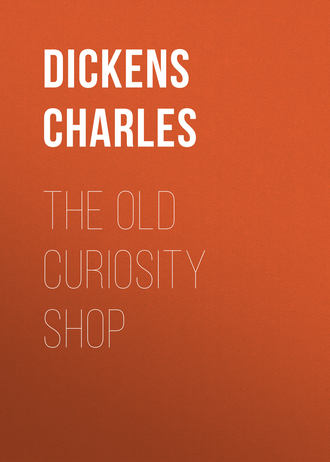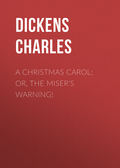
Чарльз Диккенс
The Old Curiosity Shop
‘This poor little Marchioness has been wearing herself to death!’ cried Dick.
‘No I haven’t,’ she returned, ‘not a bit of it. Don’t you mind about me. I like sitting up, and I’ve often had a sleep, bless you, in one of them chairs. But if you could have seen how you tried to jump out o’ winder, and if you could have heard how you used to keep on singing and making speeches, you wouldn’t have believed it – I’m so glad you’re better, Mr Liverer.’
‘Liverer indeed!’ said Dick thoughtfully. ‘It’s well I am a liverer. I strongly suspect I should have died, Marchioness, but for you.’
At this point, Mr Swiveller took the small servant’s hand in his again, and being, as we have seen, but poorly, might in struggling to express his thanks have made his eyes as red as hers, but that she quickly changed the theme by making him lie down, and urging him to keep very quiet.
‘The doctor,’ she told him, ‘said you was to be kept quite still, and there was to be no noise nor nothing. Now, take a rest, and then we’ll talk again. I’ll sit by you, you know. If you shut your eyes, perhaps you’ll go to sleep. You’ll be all the better for it, if you do.’
The Marchioness, in saying these words, brought a little table to the bedside, took her seat at it, and began to work away at the concoction of some cooling drink, with the address of a score of chemists. Richard Swiveller being indeed fatigued, fell into a slumber, and waking in about half an hour, inquired what time it was.
‘Just gone half after six,’ replied his small friend, helping him to sit up again.
‘Marchioness,’ said Richard, passing his hand over his forehead and turning suddenly round, as though the subject but that moment flashed upon him, ‘what has become of Kit?’
He had been sentenced to transportation for a great many years, she said.
‘Has he gone?’ asked Dick – ‘his mother – how is she, – what has become of her?’
His nurse shook her head, and answered that she knew nothing about them. ‘But, if I thought,’ said she, very slowly, ‘that you’d keep quiet, and not put yourself into another fever, I could tell you – but I won’t now.’
‘Yes, do,’ said Dick. ‘It will amuse me.’
‘Oh! would it though!’ rejoined the small servant, with a horrified look. ‘I know better than that. Wait till you’re better and then I’ll tell you.’
Dick looked very earnestly at his little friend: and his eyes, being large and hollow from illness, assisted the expression so much, that she was quite frightened, and besought him not to think any more about it. What had already fallen from her, however, had not only piqued his curiosity, but seriously alarmed him, wherefore he urged her to tell him the worst at once.
‘Oh there’s no worst in it,’ said the small servant. ‘It hasn’t anything to do with you.’
‘Has it anything to do with – is it anything you heard through chinks or keyholes – and that you were not intended to hear?’ asked Dick, in a breathless state.
‘Yes,’ replied the small servant.
‘In – in Bevis Marks?’ pursued Dick hastily. ‘Conversations between Brass and Sally?’
‘Yes,’ cried the small servant again.
Richard Swiveller thrust his lank arm out of bed, and, gripping her by the wrist and drawing her close to him, bade her out with it, and freely too, or he would not answer for the consequences; being wholly unable to endure the state of excitement and expectation. She, seeing that he was greatly agitated, and that the effects of postponing her revelation might be much more injurious than any that were likely to ensue from its being made at once, promised compliance, on condition that the patient kept himself perfectly quiet, and abstained from starting up or tossing about.
‘But if you begin to do that,’ said the small servant, ‘I’ll leave off. And so I tell you.’
‘You can’t leave off, till you have gone on,’ said Dick. ‘And do go on, there’s a darling. Speak, sister, speak. Pretty Polly say. Oh tell me when, and tell me where, pray Marchioness, I beseech you!’
Unable to resist these fervent adjurations, which Richard Swiveller poured out as passionately as if they had been of the most solemn and tremendous nature, his companion spoke thus:
‘Well! Before I run away, I used to sleep in the kitchen – where we played cards, you know. Miss Sally used to keep the key of the kitchen door in her pocket, and she always come down at night to take away the candle and rake out the fire. When she had done that, she left me to go to bed in the dark, locked the door on the outside, put the key in her pocket again, and kept me locked up till she come down in the morning – very early I can tell you – and let me out. I was terrible afraid of being kept like this, because if there was a fire, I thought they might forget me and only take care of themselves you know. So, whenever I see an old rusty key anywhere, I picked it up and tried if it would fit the door, and at last I found in the dust cellar a key that did fit it.’
Here, Mr Swiveller made a violent demonstration with his legs. But the small servant immediately pausing in her talk, he subsided again, and pleading a momentary forgetfulness of their compact, entreated her to proceed.
‘They kept me very short,’ said the small servant. ‘Oh! you can’t think how short they kept me! So I used to come out at night after they’d gone to bed, and feel about in the dark for bits of biscuit, or sangwitches that you’d left in the office, or even pieces of orange peel to put into cold water and make believe it was wine. Did you ever taste orange peel and water?’
Mr Swiveller replied that he had never tasted that ardent liquor; and once more urged his friend to resume the thread of her narrative.
‘If you make believe very much, it’s quite nice,’ said the small servant, ‘but if you don’t, you know, it seems as if it would bear a little more seasoning, certainly. Well, sometimes I used to come out after they’d gone to bed, and sometimes before, you know; and one or two nights before there was all that precious noise in the office – when the young man was took, I mean – I come upstairs while Mr Brass and Miss Sally was a-sittin’ at the office fire; and I tell you the truth, that I come to listen again, about the key of the safe.’
Mr Swiveller gathered up his knees so as to make a great cone of the bedclothes, and conveyed into his countenance an expression of the utmost concern. But the small servant pausing, and holding up her finger, the cone gently disappeared, though the look of concern did not.
‘There was him and her,’ said the small servant, ‘a-sittin’ by the fire, and talking softly together. Mr Brass says to Miss Sally, “Upon my word,” he says “it’s a dangerous thing, and it might get us into a world of trouble, and I don’t half like it.” She says – you know her way – she says, “You’re the chickenest-hearted, feeblest, faintest man I ever see, and I think,” she says, “that I ought to have been the brother, and you the sister. Isn’t Quilp,” she says, “our principal support?” “He certainly is,” says Mr Brass, “And an’t we,” she says, “constantly ruining somebody or other in the way of business?” “We certainly are,” says Mr Brass. “Then does it signify,” she says, “about ruining this Kit when Quilp desires it?” “It certainly does not signify,” says Mr Brass. Then they whispered and laughed for a long time about there being no danger if it was well done, and then Mr Brass pulls out his pocket-book, and says, “Well,” he says, “here it is – Quilp’s own five-pound note. We’ll agree that way, then,” he says. “Kit’s coming to-morrow morning, I know. While he’s up-stairs, you’ll get out of the way, and I’ll clear off Mr Richard. Having Kit alone, I’ll hold him in conversation, and put this property in his hat. I’ll manage so, besides,” he says, “that Mr Richard shall find it there, and be the evidence. And if that don’t get Christopher out of Mr Quilp’s way, and satisfy Mr Quilp’s grudges,” he says, “the Devil’s in it.” Miss Sally laughed, and said that was the plan, and as they seemed to be moving away, and I was afraid to stop any longer, I went down-stairs again. – There!’
The small servant had gradually worked herself into as much agitation as Mr Swiveller, and therefore made no effort to restrain him when he sat up in bed and hastily demanded whether this story had been told to anybody.
‘How could it be?’ replied his nurse. ‘I was almost afraid to think about it, and hoped the young man would be let off. When I heard ‘em say they had found him guilty of what he didn’t do, you was gone, and so was the lodger – though I think I should have been frightened to tell him, even if he’d been there. Ever since I come here, you’ve been out of your senses, and what would have been the good of telling you then?’
‘Marchioness,’ said Mr Swiveller, plucking off his nightcap and flinging it to the other end of the room; ‘if you’ll do me the favour to retire for a few minutes and see what sort of a night it is, I’ll get up.’
‘You mustn’t think of such a thing,’ cried his nurse.
‘I must indeed,’ said the patient, looking round the room. ‘Whereabouts are my clothes?’
‘Oh, I’m so glad – you haven’t got any,’ replied the Marchioness.
‘Ma’am!’ said Mr Swiveller, in great astonishment.
‘I’ve been obliged to sell them, every one, to get the things that was ordered for you. But don’t take on about that,’ urged the Marchioness, as Dick fell back upon his pillow. ‘You’re too weak to stand, indeed.’
‘I am afraid,’ said Richard dolefully, ‘that you’re right. What ought I to do! what is to be done!’
It naturally occurred to him on very little reflection, that the first step to take would be to communicate with one of the Mr Garlands instantly. It was very possible that Mr Abel had not yet left the office. In as little time as it takes to tell it, the small servant had the address in pencil on a piece of paper; a verbal description of father and son, which would enable her to recognise either, without difficulty; and a special caution to be shy of Mr Chuckster, in consequence of that gentleman’s known antipathy to Kit. Armed with these slender powers, she hurried away, commissioned to bring either old Mr Garland or Mr Abel, bodily, to that apartment.
‘I suppose,’ said Dick, as she closed the door slowly, and peeped into the room again, to make sure that he was comfortable, ‘I suppose there’s nothing left – not so much as a waistcoat even?’
‘No, nothing.’
‘It’s embarrassing,’ said Mr Swiveller, ‘in case of fire – even an umbrella would be something – but you did quite right, dear Marchioness. I should have died without you!’
CHAPTER 65
It was well for the small servant that she was of a sharp, quick nature, or the consequence of sending her out alone, from the very neighbourhood in which it was most dangerous for her to appear, would probably have been the restoration of Miss Sally Brass to the supreme authority over her person. Not unmindful of the risk she ran, however, the Marchioness no sooner left the house than she dived into the first dark by-way that presented itself, and, without any present reference to the point to which her journey tended, made it her first business to put two good miles of brick and mortar between herself and Bevis Marks.
When she had accomplished this object, she began to shape her course for the notary’s office, to which – shrewdly inquiring of apple-women and oyster-sellers at street-corners, rather than in lighted shops or of well-dressed people, at the hazard of attracting notice – she easily procured a direction. As carrier-pigeons, on being first let loose in a strange place, beat the air at random for a short time before darting off towards the spot for which they are designed, so did the Marchioness flutter round and round until she believed herself in safety, and then bear swiftly down upon the port for which she was bound.
She had no bonnet – nothing on her head but a great cap which, in some old time, had been worn by Sally Brass, whose taste in head-dresses was, as we have seen, peculiar – and her speed was rather retarded than assisted by her shoes, which, being extremely large and slipshod, flew off every now and then, and were difficult to find again, among the crowd of passengers. Indeed, the poor little creature experienced so much trouble and delay from having to grope for these articles of dress in mud and kennel, and suffered in these researches so much jostling, pushing, squeezing and bandying from hand to hand, that by the time she reached the street in which the notary lived, she was fairly worn out and exhausted, and could not refrain from tears.
But to have got there at last was a great comfort, especially as there were lights still burning in the office window, and therefore some hope that she was not too late. So the Marchioness dried her eyes with the backs of her hands, and, stealing softly up the steps, peeped in through the glass door.
Mr Chuckster was standing behind the lid of his desk, making such preparations towards finishing off for the night, as pulling down his wristbands and pulling up his shirt-collar, settling his neck more gracefully in his stock, and secretly arranging his whiskers by the aid of a little triangular bit of looking glass. Before the ashes of the fire stood two gentlemen, one of whom she rightly judged to be the notary, and the other (who was buttoning his great-coat and was evidently about to depart immediately) Mr Abel Garland.
Having made these observations, the small spy took counsel with herself, and resolved to wait in the street until Mr Abel came out, as there would be then no fear of having to speak before Mr Chuckster, and less difficulty in delivering her message. With this purpose she slipped out again, and crossing the road, sat down upon a door-step just opposite.
She had hardly taken this position, when there came dancing up the street, with his legs all wrong, and his head everywhere by turns, a pony. This pony had a little phaeton behind him, and a man in it; but neither man nor phaeton seemed to embarrass him in the least, as he reared up on his hind legs, or stopped, or went on, or stood still again, or backed, or went side-ways, without the smallest reference to them – just as the fancy seized him, and as if he were the freest animal in creation. When they came to the notary’s door, the man called out in a very respectful manner, ‘Woa then’ – intimating that if he might venture to express a wish, it would be that they stopped there. The pony made a moment’s pause; but, as if it occurred to him that to stop when he was required might be to establish an inconvenient and dangerous precedent, he immediately started off again, rattled at a fast trot to the street corner, wheeled round, came back, and then stopped of his own accord.
‘Oh! you’re a precious creatur!’ said the man – who didn’t venture by the bye to come out in his true colours until he was safe on the pavement. ‘I wish I had the rewarding of you – I do.’
‘What has he been doing?’ said Mr Abel, tying a shawl round his neck as he came down the steps.
‘He’s enough to fret a man’s heart out,’ replied the hostler. ‘He is the most wicious rascal – Woa then, will you?’
‘He’ll never stand still, if you call him names,’ said Mr Abel, getting in, and taking the reins. ‘He’s a very good fellow if you know how to manage him. This is the first time he has been out, this long while, for he has lost his old driver and wouldn’t stir for anybody else, till this morning. The lamps are right, are they? That’s well. Be here to take him to-morrow, if you please. Good night!’
And, after one or two strange plunges, quite of his own invention, the pony yielded to Mr Abel’s mildness, and trotted gently off.
All this time Mr Chuckster had been standing at the door, and the small servant had been afraid to approach. She had nothing for it now, therefore, but to run after the chaise, and to call to Mr Abel to stop. Being out of breath when she came up with it, she was unable to make him hear. The case was desperate; for the pony was quickening his pace. The Marchioness hung on behind for a few moments, and, feeling that she could go no farther, and must soon yield, clambered by a vigorous effort into the hinder seat, and in so doing lost one of the shoes for ever.
Mr Abel being in a thoughtful frame of mind, and having quite enough to do to keep the pony going, went jogging on without looking round: little dreaming of the strange figure that was close behind him, until the Marchioness, having in some degree recovered her breath, and the loss of her shoe, and the novelty of her position, uttered close into his ear, the words – ‘I say, Sir’ —
He turned his head quickly enough then, and stopping the pony, cried, with some trepidation, ‘God bless me, what is this!’
‘Don’t be frightened, Sir,’ replied the still panting messenger. ‘Oh I’ve run such a way after you!’
‘What do you want with me?’ said Mr Abel. ‘How did you come here?’
‘I got in behind,’ replied the Marchioness. ‘Oh please drive on, sir – don’t stop – and go towards the City, will you? And oh do please make haste, because it’s of consequence. There’s somebody wants to see you there. He sent me to say would you come directly, and that he knowed all about Kit, and could save him yet, and prove his innocence.’
‘What do you tell me, child?’
‘The truth, upon my word and honour I do. But please to drive on – quick, please! I’ve been such a time gone, he’ll think I’m lost.’
Mr Abel involuntarily urged the pony forward. The pony, impelled by some secret sympathy or some new caprice, burst into a great pace, and neither slackened it, nor indulged in any eccentric performances, until they arrived at the door of Mr Swiveller’s lodging, where, marvellous to relate, he consented to stop when Mr Abel checked him.
‘See! It’s the room up there,’ said the Marchioness, pointing to one where there was a faint light. ‘Come!’
Mr Abel, who was one of the simplest and most retiring creatures in existence, and naturally timid withal, hesitated; for he had heard of people being decoyed into strange places to be robbed and murdered, under circumstances very like the present, and, for anything he knew to the contrary, by guides very like the Marchioness. His regard for Kit, however, overcame every other consideration. So, entrusting Whisker to the charge of a man who was lingering hard by in expectation of the job, he suffered his companion to take his hand, and to lead him up the dark and narrow stairs.
He was not a little surprised to find himself conducted into a dimly-lighted sick chamber, where a man was sleeping tranquilly in bed.
‘An’t it nice to see him lying there so quiet?’ said his guide, in an earnest whisper. ‘Oh! you’d say it was, if you had only seen him two or three days ago.’
Mr Abel made no answer, and, to say the truth, kept a long way from the bed and very near the door. His guide, who appeared to understand his reluctance, trimmed the candle, and taking it in her hand, approached the bed. As she did so, the sleeper started up, and he recognised in the wasted face the features of Richard Swiveller.
‘Why, how is this?’ said Mr Abel kindly, as he hurried towards him. ‘You have been ill?’
‘Very,’ replied Dick. ‘Nearly dead. You might have chanced to hear of your Richard on his bier, but for the friend I sent to fetch you. Another shake of the hand, Marchioness, if you please. Sit down, Sir.’
Mr Abel seemed rather astonished to hear of the quality of his guide, and took a chair by the bedside.
‘I have sent for you, Sir,’ said Dick – ‘but she told you on what account?’
‘She did. I am quite bewildered by all this. I really don’t know what to say or think,’ replied Mr Abel.
‘You’ll say that presently,’ retorted Dick. ‘Marchioness, take a seat on the bed, will you? Now, tell this gentleman all that you told me; and be particular. Don’t you speak another word, Sir.’
The story was repeated; it was, in effect, exactly the same as before, without any deviation or omission. Richard Swiveller kept his eyes fixed on his visitor during its narration, and directly it was concluded, took the word again.
‘You have heard it all, and you’ll not forget it. I’m too giddy and too queer to suggest anything; but you and your friends will know what to do. After this long delay, every minute is an age. If ever you went home fast in your life, go home fast to-night. Don’t stop to say one word to me, but go. She will be found here, whenever she’s wanted; and as to me, you’re pretty sure to find me at home, for a week or two. There are more reasons than one for that. Marchioness, a light! If you lose another minute in looking at me, sir, I’ll never forgive you!’
Mr Abel needed no more remonstrance or persuasion. He was gone in an instant; and the Marchioness, returning from lighting him down-stairs, reported that the pony, without any preliminary objection whatever, had dashed away at full gallop.
‘That’s right!’ said Dick; ‘and hearty of him; and I honour him from this time. But get some supper and a mug of beer, for I am sure you must be tired. Do have a mug of beer. It will do me as much good to see you take it as if I might drink it myself.’
Nothing but this assurance could have prevailed upon the small nurse to indulge in such a luxury. Having eaten and drunk to Mr Swiveller’s extreme contentment, given him his drink, and put everything in neat order, she wrapped herself in an old coverlet and lay down upon the rug before the fire.
Mr Swiveller was by that time murmuring in his sleep, ‘Strew then, oh strew, a bed of rushes. Here will we stay, till morning blushes. Good night, Marchioness!’





